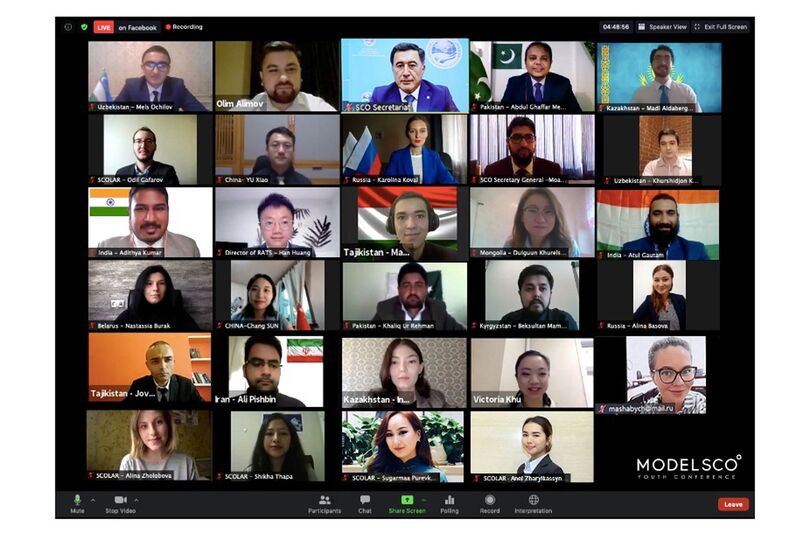On 15 August 2020, the SCO Secretariat was the venue of the 5th SCO Model international youth conference held in a video format. Its participants discussed intra-cultural entrepreneurship as a post-COVID-19 economic development tool in the SCO region. Young experts working in various business fields from the SCO member states and observer countries took part in it.
The event was organised by the SCOLAR Network Youth Platform with the support of the SCO Secretariat. Attendees included 200 spectators using Zoom, and 800 people who watched live via Facebook.
The participants delivered reports on ways to overcome the pandemic's consequences and to facilitate the development of entrepreneurship. They discussed the Organisation's agenda in the context of the current global situation, exchanged opinions on the development of e-commerce, the digital economy and online education in the SCO countries, as well as the conversion of businesses and entrepreneurship to the digital format.
SCO Secretary-General Vladimir Norov addressed the participants at the end of the event. He thanked everyone for their active and creative work. He noted that the subject matter of the current conference was very topical and timely because the coronavirus pandemic has affected all spheres of human activities. It has seriously impacted the lifestyle of millions of people all over the world.
Mr Norov dwelt separately on the reports of every event participant and pointed out the good preparedness of the delegations, the high quality and level of opinion exchanges, as well as the concluding document's discussion. He noted that ideas and views, voiced at the conference, could prove useful for studying various aspects of overcoming economic problems of the SCO region after the pandemic.
According to the SCO Secretary-General, the current crisis has mostly impacted young people, and their customary lifestyle has been disrupted. Young people face serious problems and changes in many spheres of everyday life. "In the current conditions, the governments of the SCO member states focus on expanding and supporting youth entrepreneurship. Active work is underway to involve young people in entrepreneurial activities. For example, the Organisation's countries advocate the development of business incubators for improving the regional business climate and supporting youth startups," Mr Norov added.
The Secretary-General also acquainted the participants with the current SCO activities and the results of the main events in 2019-2020, as well as the process of adapting the work of the association's mechanisms to the long-distance format in conditions of the pandemic.
Following the event, its participants passed a joint communique noting the importance of intra-cultural entrepreneurship for overcoming the consequences of the coronavirus pandemic. The document notes the need for joint efforts to develop modern information technologies, e-commerce, logistics, online education in conditions of the pandemic. The document reflects agreements to draft a programme for supporting small and medium-sized businesses, discussing the possibility of establishing an international research centre to study AI and big data volumes and to expand the scientific and educational online platform Youth Entrepreneurship Initiative for students and entrepreneurs in the SCO region.
Event participants voted to determine the winners of an interactive game. Abdul Ghaffar Memon, the head of the Pakistani delegation came first in the Best Participant category, followed by Madi Aldabergenov, the head of the Kazakhstani delegation. Yu Xiao and Sun Chang, members of the Chinese delegation, came first in the Best Report category. The second place went to members of the Indian delegation (Adithya Kumar and Atul Gautam), as well as to Karolina Koval and Alina Basova from Russia. The winners received the SCO Secretary-General's citations.
The SCO Model is an educational interactive game simulating the work of the SCO agencies. It involves pupils from secondary and higher education establishments who are interested in studying the functions of the SCO bodies and their work. The educational game allows participants to study international relations and diplomacy, to improve their writing, negotiating and teamwork skills and to expand on new ideas and projects.
